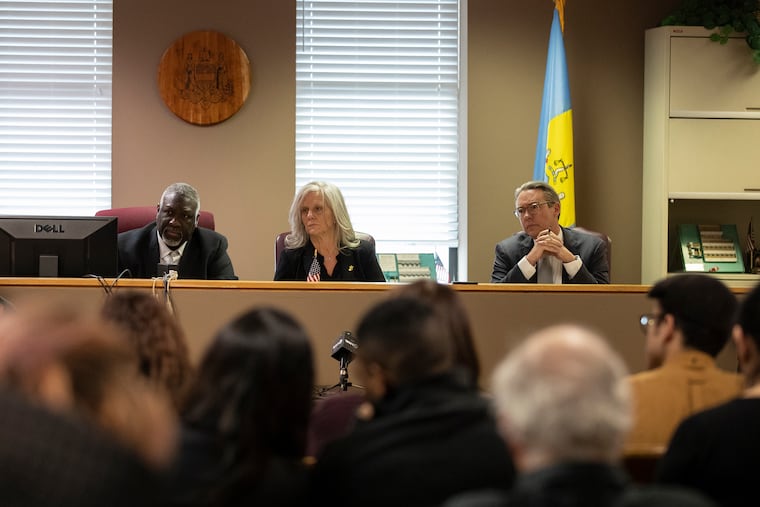Philly city commissioners election 2019: A look at the elected office that runs elections
Philly has more than one million voters; three city commissioners are responsible for ensuring they have a voice. Here’s what you need to know for the 2019 city commissioner race.

If voting is the voice of the people, the Philadelphia city commissioners are tasked with ensuring it’s heard.
As the officials who run the city’s elections, the three commissioners are themselves elected every four years. It’s time again. The people of Philadelphia will pick their elections administrators in May and November, deciding how they want elections run.
And with heightened concerns over election security and Gov. Tom Wolf having ordered all counties to upgrade their voting machines, the usually obscure office is in the spotlight.
“They provide oversight over the election process, which we all want to be trustworthy and to be a system that’s got integrity,” said David Thornburgh, head of good-government group Committee of Seventy.
>>READ MORE: Philly has a record number of Latino candidates, and now their names will be spelled correctly
It’s a weighty mission; commissioners are responsible for safeguarding smooth, fair elections in which every vote is secure and accurately counted. Their responsibilities include:
Ensuring eligible voters can register
Choosing and monitoring more than 800 polling places for nearly 1,700 precincts
Mailing and counting absentee ballots
Selecting and maintaining voting machines
Running elections
Ensuring the integrity of the vote
Counting election results
“People need to know this is a lot more than just moving paper,” said Kevin Greenberg, an election lawyer in Philadelphia. “The best way to think about the importance of the commissioners’ office is to think about what happens when it goes wrong.”
When it goes wrong, registration problems arise; long lines form on Election Day; machines break down; and some locations are understaffed, hard to access, or even closed. Absentee votes go missing, votes go uncounted, and the whole system is vulnerable to attack or fraud.
When they perform well, commissioners can go beyond the essential functions of the office. They can work to increase turnout and civic engagement, to make the electoral system more transparent and accessible, to make data available, and to advocate for electoral reform in Harrisburg and Washington.
>>READ MORE: Philly elections officials won’t overturn controversial voting-machine decision
Electing the elections officials
The three commissioners are elected together every four years. The majority party — in the city, Democrats outnumber Republicans by a 7-1 ratio — can win only two of the seats, leaving the third open to Republicans, a third party, or an independent candidate.
Two commissioners are paid $131,000 annually; the chair, $140,000.
This year, 13 Democrats are running, including incumbent Lisa Deeley. (The other current Democratic commissioner is retiring.)
Republican Al Schmidt is running unopposed for reelection.
In some states, elections officials are appointed. At the state level, Pennsylvania’s chief elections officer is the secretary of the commonwealth, a position appointed by the governor.
Electing the commissioners provides accountability, Schmidt said — “If we screw up, we pay the price directly” — and minority-party representation is an additional safeguard.
Greenberg, who is not involved in a commissioner campaign this year but has worked on Democratic campaigns and represented Democrats in election-related litigation, agreed: “This is a good check on the elections process.”
But the office has also drawn intense criticism in recent years. Anthony Clark, the retiring commissioner, is known for not showing up to work, which Mayor Jim Kenney described as “insulting” to city employees. Longtime chair of the Philadelphia Democratic Party Bob Brady called Clark a “disgrace.”
The Committee of Seventy tried and failed to eliminate the office as an elected position.
“We tried our best to work every angle we could to build the political will to abolish the office,” Thornburgh said.
Regardless, he said, voters have an opportunity now to decide just what they want when it comes to elections.
Beyond the core responsibilities
“Things fall apart if you are not focused on the core responsibilities of the department, and those are making sure that voters can get registered and people can vote on Election Day,” Schmidt said.
The commissioners depend on staffs to help with day-to-day workings of the office. Much of the job, Schmidt said, is managing people and setting priorities for the office.
Beyond that, it’s up to commissioners to set their own agendas.
Several candidates say they’ll focus on increasing turnout through methods such as outreach campaigns. Candidates also support a variety of changes, including early voting, no-excuse absentee voting, and changes to Pennsylvania’s tight absentee ballot deadlines.
The limitations
The commissioners operate on a $10 million annual budget, or about $9.50 for each of the city’s nearly 1,050,000 registrants.
Then there are the state’s laws, which in some cases are highly restrictive and specific regarding elections.
Want to change the absentee ballot deadlines so more votes get counted instead of thrown out? You’ll need to change the Election Code.
Want to change absentee rules to stop disenfranchising firefighters and others who work on Election Day? You’ll need to change the state Constitution.
Electoral reform is often a matter of politics. And in Harrisburg, many lawmakers are wary of changing the system.
But this is where the commissioners could have real power, Greenberg and Thornburgh said. In a battleground state of eight million voters, the officials who run elections in the largest city — to 1 in 8 of the state’s voters — ought to have some sway.
“You have to be an active and vocal presence in Harrisburg to make the case as best you can with the leadership of the legislature, the governor’s office, other advocacy organizations,” Thornburgh said. “You should be looking to build alliances and put together sort of a caucus. You should be exerting some political leadership.”